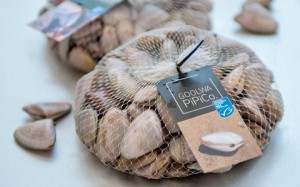Agriculture, Food and Fisheries Minister Leon Bignell yesterday opened a new packaging facility at Port Eliot to help Goolwa’s pipi (cockle) fishery secure new export markets and create employment in the region.

“Pipis are an important commercial and recreational fishing species in South Australia, and the commercial fishery has developed rapidly during the past 15 years in response to a growing human consumption market. In the 1990s, the fishery was worth about $750,000 a year. In 2012-13, it generated $3.2 million for the local economy,” Minister Bignell said.
“The new facility would allow the industry to develop a range of product formats and pack sizes for domestic and international markets. The industry was now looking to the future and how to value-add so it could continue to be a significant contributor to the economy of Goolwa and the Lower Lakes.”
The new packaging factory for the Goolwa Pipi Company – which involves a number of pipi quota licence holders – has been established with the help of a $75,000 State Government grant following the development of a modified atmosphere packaging system by the Goolwa Pipi Harvesters Association, in association with SARDI and supported by the State Government’s Innovation Voucher Program.
Mr Bignell said the new packaging system extended the shelf life of Pipis, making it easier for transportation.
“The Pipi industry made a clear choice to move from being a group of individual fishers to a consolidated industry food producer and marketer looking at expanding into overseas markets,” he said.
“This is a great step which shows what could be achieved when industry and Government work together.”
Independent Chair of the Goolwa Pipi Harvesters’ Association, Roger Edwards, said the company intends to invest a further $500,000 to create a fully commercial modified atmosphere packaging plant following the success of the initial market trials and the purchase of the new facility.
“We believe that within two years the plant will have the ability to produce up to 500 kilograms a day, allowing the packaged Pipi to expand into both domestic and international markets,” he said.




















